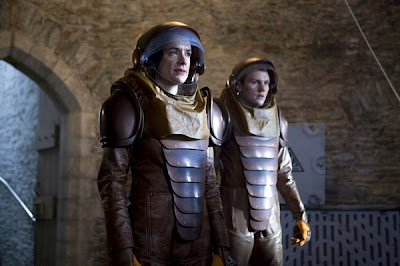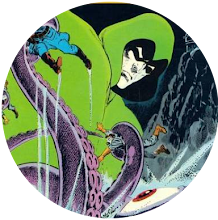Despite a paper thin plot - the original staff are in one room and decide to move to another - it throws in enough twists, turns, details and deaths to keep us going, as the Doctor teams up with his duplicate to try and get as many people out of the acid factory alive as possible.
 |
| The ganger Jennifer. Sometimes adrip but rarely a drip. |
The exception to the right people getting killed was the ultimate survival of the original Cleaves who'd been a thoroughly unpleasant and block-headed individual all the way through. I suppose we have to put her unpleasantness down to the blood clot in her brain, and her later personality change down to its removal. But why do I get a feeling the duplicate Cleaves and Doctor will be back before the end of the series?
If it was mostly an entertaining episode, and the factory staff turned out to be more interesting than in The Rebel Flesh, the main downsides involved the assistants. Rory really is spectacularly stupid in this half, trusting "Jennifer" to a ridiculous degree, even when she's acting in a manner that should set alarm bells ringing in the emptiest of heads. Happily operating machinery, without the slightest clue what it's supposed to do, really doesn't reflect well on a man. As for, "This wheel's way too hard for a girl to turn," Argh!.
Amy, meanwhile, is consistently stupid and unpleasant, tactlessly insulting the duplicate Doctor who's trying to save her, and, for no good reason, blurting out that she's seen him die. I suppose we could put it down to her being a duplicate and not the real deal but sadly her stupidity and ignorance here aren't out of character for the original Amy.
And that brings us the climax that threatens to overshadow the whole episode, as we get the reveal that the Amy we've been following for the last few weeks isn't Amy at all but a ganger, while the real Amy lies in a room somewhere, about to give birth, as Frances Barber shows off her taste in lipstick.
Compelling a revelation as it is, the ginger ganger is the episode's real problem. After two episodes of the Doctor telling us that gangers are real people too and should be allowed to live, he then, at the tale's climax, whips out his sonic screwdriver (where did he get that from? He's already given it to his lookalike) and ruthlessly destroys the fake Amy for no reason at all. I assume this section was written by Steven Moffat rather than Matthew Graham and it seems that either Moffat hadn't at that point read Graham's script or simply didn't care about it, as the Doctor's action here takes the philosophical point Graham's just spent two episodes making, screws it up and throws it in the bin.
So, Amy's about to give birth. But to what? Will it be the space suit girl? Will it be River Song? Will it be to a football team that can actually take on Barcelona? Only next week will tell us. Will we be there? Of course we will. Will we have a clue what's going on? Don't bet your bow-tie on it.


































